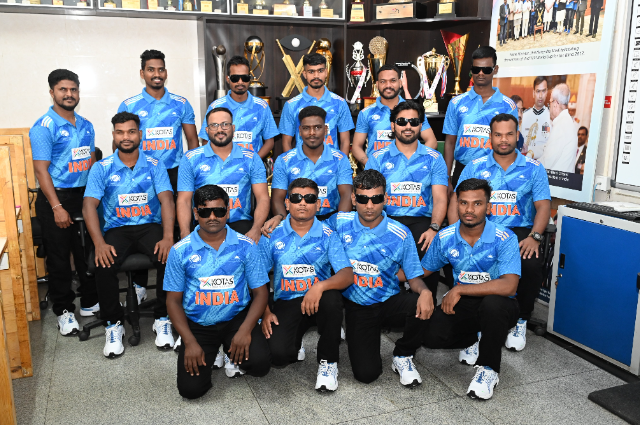Mahantesh G. Kivadasannavar, the president of the Cricket Association for the Blind in India (CABI) had requested Sara Minkara who is a Special Advisor on International Disability Rights at the U.S. Department of State, to advocate for the inclusion of blind cricket in the 2028 Paralympics.
Background
Cricket has been added to the 2028 Olympics and CABI members are now pushing for the inclusion of cricket for visually impaired athletes in the 2028 Paralympics which will be held in Los Angeles.
Meeting with Sara Minkara
Mahantesh G. Kivadasannavar and his team from Samarthanam and CABI met with Sara Minkara during his visit to the USA. They had a productive discussion, shared information about Samarthanam's work, and showed a video about blind cricket, which impressed Minkara and her team.
Promoting Inclusivity in Sports
The main goal of this tour is to promote inclusivity in sports by highlighting the achievements and capabilities of visually impaired athletes. CABI hopes to foster a more inclusive sporting culture in the U.S. and globally.
Future Opportunities
Sara Minkara offered to connect CABI with important people in the sports and disability rights sectors which could lead to future opportunities for promoting blind cricket in the U.S. and globally.
The Chairman of the Cricket Association for the Blind in India (CABI) highlighted the significant value that support from the USA could bring. Officials are looking into every opportunity to promote cricket for the visually impaired in America. He mentioned that her support is immensely valuable, noting her excitement upon seeing the cricket ball. She shared that she used to play goalball and believed cricket for the blind could be even more engaging. She is eager to explore this potential further.
Additionally, the Indian Men's Blind Cricket Team, the reigning world champions is preparing for a landmark tour of the United States. This tour will cover ten major states including Boston, New York, New Jersey, Washington DC, Chicago, Detroit, Dallas, Los Angeles, Seattle, and the Bay Area. The objective of the tour is to increase awareness of blind cricket in the U.S. where the sport is not widely known. Through a series of matches, workshops, and community interactions, the team aims to highlight the sport's distinct elements and the remarkable skills of visually impaired cricketers.
Cricket Association for the Blind in India (CABI)
The Cricket Association for the Blind in India (CABI) is a key initiative established by the Samarthanam Trust for the Disabled. As the leading organization, CABI oversees, organizes and promotes cricket specifically for visually impaired individuals in India.
Mission and Objectives
CABI was created with the goal of competitive cricket to help visually impaired individuals view life with a positive attitude. The organization aims to build confidence and encourage these individuals to strive for success. Through participation in cricket, players can broaden their horizons by travelling within India and internationally, interacting with people from diverse cultural backgrounds and showcasing their abilities and talents.
Structure and Affiliations
CABI operates with the support of 30 state associations across India. It is affiliated with the World Blind Cricket Ltd (WBC) and the Indian Paralympic Committee, although it is not under the jurisdiction of the Board of Control for Cricket in India (BCCI).
Promoting Awareness and Inspiration
CABI is dedicated to raising awareness about cricket for the blind both within India and globally. By promoting this sport, CABI hopes to inspire the visually impaired community and convey the message that true limitations are only mental and that anything is possible with determination.
Previous Challenging times for visually challenged Cricketers
Previously, John David who was the general secretary of India's blind cricket team had emphasized that Blind cricketers deserved the same respect and recognition as sighted cricketers.
When asked about the significant challenges faced by the Indian Blind Cricket team, Mr. John David highlighted several issues. Despite winning four world cups and numerous bilateral series, many players still go unpaid. Back in 2010, each player received only Rs 3000 per match. In contrast, able-bodied cricketers even at the national level earn much higher salaries and often receive regular job offers from corporations and the government. Another major issue for the Cricket Association for the Blind in India (CABI) is finding suitable practice grounds and securing sponsorships for the national blind cricket team. Government bodies provide no support, leaving the responsibility to the Board of Control for Cricket in India (BCCI) as noted by Mr. John David. Additionally, he noted that the association faces difficulties with player transportation. It's very challenging for players to travel to matches due to the lack of proper transportation to the stadium.
The Current State of Blind Cricket in India: Improved Conditions and Sponsorships
The state of blind cricket in India has significantly improved over the past decade. Corporate sponsorships have become more common for tournaments. In the past, the team faced numerous hardships such as travelling in the general compartments of trains without proper food and facilities. Players often had to share equipment with the entire team using just two bats because many couldn't afford their own gear. Mr. John emphasised that he was fortunate because of his father, who was in the Army had gifted him a high-quality bat.
Prize Money and Financial Support
Currently, players are starting to receive prize money. After winning the World Cup in Dubai, they were awarded ₹5 lakh by the Indian government and ₹3 lakh by the BCCI. Additionally, some state governments provided cash prizes to their players. This is a positive development, as it indicates that financial support is beginning to flow in.
Need for Financial Security
However, Mr. John expressed a change in what remains crucial is achieving financial security for Indian visually challenged cricket players. Many players like captain Ajay Kumar Reddy were employed and had to take leave from work to participate in tournaments. This situation needs to change to ensure that players can focus on their sport without financial worries.
. . .
References:

